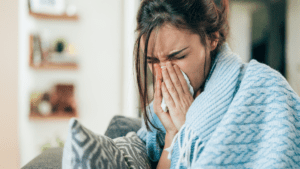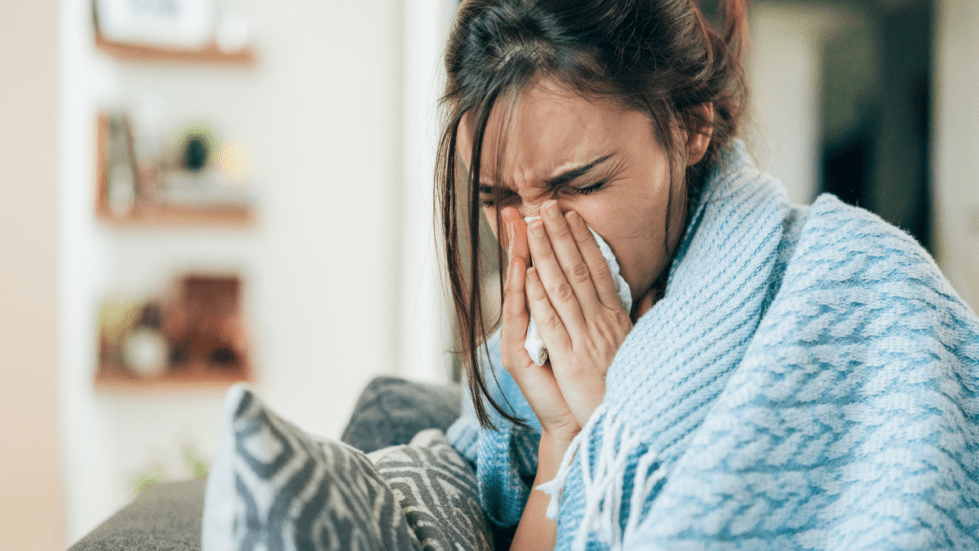

Bayhealth explains the differences between flu, COVID, RSV and the flu as well as what to do if you are sick
As the weather turns colder, thoughts turn to what has always been known as cold and flu season. Sniffles, aches, cough and a general feeling of malaise are signs that you may be coming down with something. After coming out of a pandemic, however, those symptoms are harder to ignore than they were pre-COVID as people now realize how easy it is to infect others with illnesses. But how do you know whether what you have is a common cold or something more serious.
“Because COVID the flu, RSV, allergies and the common cold often have the same symptoms, it is harder to pinpoint exactly what is wrong,” John Fink, MD, Vice-President of Quality and Medical Affairs for Bayhealth, said. “There are a few key differences to look for, however, that may help you identify what is wrong so you can take the proper steps.”
Both the flu and COVID-19 symptoms can come on fast with flu symptoms developing within four days of exposure and COVID-19 between one and ten days. Allergies don’t cause fever or body aches, although they make you feel more tired than usual, and you may have a sore throat. The symptoms remain the same and don’t seem to worsen over time like they can with COVID, the flu or RSV. Itchy eyes, nose and throat are often caused by seasonal allergies.
If you suspect you have COVID-19, consider visiting a clinic wearing a mask, to take a COVID-Flu PCR test which provides results in 20 minutes. This test looks for both flu and COVID-19 so treatment can begin quickly.
“Flu season officially started October 2 and it is possible this could be a severe fu season,” Dr. Fink said. “A flu vaccine as well as a COVID vaccine are your best protections against getting a severe case of either illness. All our primary care offices offer vaccines for adults while some of them also offer vaccines for children.”
Respiratory Syncytial Virus, or RSV, is commonly found in children but it is possible for adults to contract it as well. The symptoms are cold-like, and most healthy people recover within a week or two. Those with compromised immune systems and older adults are more at risk for severe illness. There is no vaccine for RSV.
“If you have any symptoms of a contagious illness, stay home from work or school and isolate from other family members,” Dr. Fink said. “This is true of all contagious illnesses, not just COVID. Don’t share drinking glasses or utensils with others, practice really good handwashing and make sure you are disinfecting surfaces. If you must leave the house, wear a mask. Call ahead before going to your doctor if you suspect you have RSV, the flu or COVID.”
Even if you have had vaccines against illnesses, including COVID, flu or pneumonia, Dr. Fink reminds everyone to continue using caution.
“While vaccines are extremely effective in preventing hospitalization and death, they do not completely eliminate the chance of getting the illness,” Dr. Fink said. “People who are vaccinated, especially those who have not had boosters, need to be on the lookout for symptoms and to isolate and get tested if they become ill. Many of those cases will have mild symptoms which are very similar to seasonal colds.”
Mild symptoms include nasal congestion, sneezing and a low-grade fever. Kelly Gardner, RN, CIC, Senior Manager of Infection Control offered suggestions to help spread not only the thread of COVID-19 but also other contagious illnesses as well.
“No matter what variant is out there, we need to do the same things we’ve been doing during the pandemic,” Gardner said. “It’s all about breaking the chain of infection, just like the flu which also has different strains and can mutate.”
Gardner, like Dr. Fink, suggested that vaccination and updated boosters are the best way to protect yourself. Hand washing, face coverings in public, social distancing, cleaning and disinfecting surfaces regularly while also staying home if you are sick are the best ways to prevent spreading any illness.
To learn more about vaccinations, visit CoronavirusDelaware.gov. To learn more about other contagious illnesses, visit the Delaware Division of Public Health.
Share this Post


